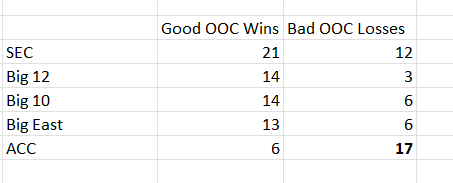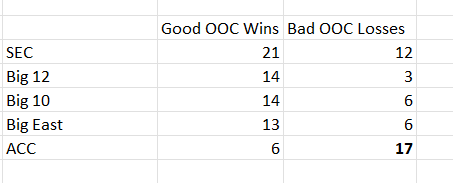Of course the horrible play of the ACC out of conference mattered. And it was a down regular season for the ACC. To say that it did not matter, or that it was not "down" as some of you are now suggesting above is incorrect (to be fair the post I am quoting is not stating this directly but others are so my post below is generally addressing all of and I quoted the last one) I think you are getting a few things mixed up (See my Part 2 below)
Part 1 - The ACC was horrible in the regular season which includes out of conference. It was clearly a down year in that regard. And it made a huge difference on the outcomes of several teams entering the tournament. And that was fair.
I droned on all year that the ACC's poor out of conference play in November and December would bite them in the ass on Selection Weekend. And I was indeed right
- Wake Forest missed the tournament because of it.
- Notre Dame had to go to a play in game because of it
- Virginia Tech had to win the ACC tourney to get in.
- If the ACC had played like it normally does in Nov/Dec, Virginia probably is an at-large
- Syracuse probably needed to go 14-6 or 13-7 (with some conference tourney wins) to have a chance to get in.
And all of the above outcomes were entirely fair. How can you expect the ACC to get anywhere near the respect of these other 4 conferences. The committee simply cannot guess who has improved or who has not. It has to go with the data. And the ACC did very poorly out of conference -- which dramatically hurt Q1 win opportunities for ACC teams post January.
The following table only considers out of conference wins and losses. If there is such a disparity how can you expect the committee to look at an ACC team that is 11-9 as compared to any team with a similar record in any of those conferences.
View attachment 215920
How could one possibly justify the ACC getting as much respect in tourney selection as any of the above 4 conferences. This wasn't even a case of being close. This was a case of the ACC being closer to the level of play as the MWC, A-10, WCC, the American before January as compared to the Top 4. In typical years the ACC is right there with the other 4. this year it was not. Those numbers are historically bad for the ACC - it was a down year for them in the regular season.
Clearly what the ACC did mattered. My droning on it was not unjustified.
I would be interested in what some of you think the committee should have done instead. Just guess and make up stuff on the fly?
Part 2 - Just because a conference did poorly or strongly in the regular season does not mean its member teams will do poorly or strongly in the post-seaon tournament. Which has happened this year with the ACC and BIG has happened in the past.
A paragraph below a post I made on March 11. It's basically a new season starting in March. But the teams are justifiably selected and seeded based on what they did before that. So if the ACC is down it matters on actually getting in (and fairly so)... but once in you need to reconsider. This has actually worked out well for me betting as I have rode the ACC hard in this tourney and the BIG losing as well. Although even an optomist about the ACC has had to have had their expectations surpassed. For the BIG failing is not that far from the norm, so this failure is not all that unexpected.
Who are some lesser talked about teams we might see in the sweet 16, and which big boys might get knocked out earlier than expected? I didn't watch nearly as much this year as usual. I won't be sleeping on any Big 12 teams this year.

syracusefan.com
"The Pac-12 seemed like the worst P5 conference last year and then absolutely dominated in the NCAA tournament.
The following is based on observation, I have no numbers to back it up:
The system favours conferences that as a whole played the best before the end of December. And that is ultimately the fairest way to do things since how can you tell which conference is improving once they are only playing themselves. You can't. But what sometimes happens is that the 4th or 5th place team in "great" conference that gets a 4 seed is not as good as other 4 seeds.
My advice is don't pick your brackets based on the one or two conferences that get the most seeds or those that hog the top 4/5 seed lines. Those conferences on a "per school" basis have tended to do worse and proportionately have more flops before the sweet 16.. and this is not a new trend. Think back to the when the Big East got a huge # of seeds. They had some national titles, but a higher proportion than others of flops as well. (thanks Pitt, Georgetown and Notre Dame!). This has happened when the Big Ten has been very good, or the years where the New Big East and Big 12 get a high % of their teams in.
If the above sounds confusing, I'll give an example:
Team A - 3 or 4 seed from Power Conference with 8 bids and 5 teams in the top 5 seed lines
Team B - 3 or 4 seed from Power Conference with 5 bids and 2 teams in the top 5 seed lines
Team A has tended to flop earlier than Team B."
Respect
The ACC earned the scrutiny and disregard it had during the season. It earned the comments of being down. But the ACC has also earned most of that respect back in the tournament.

www.si.com




